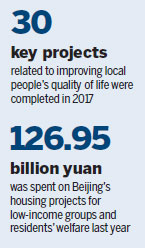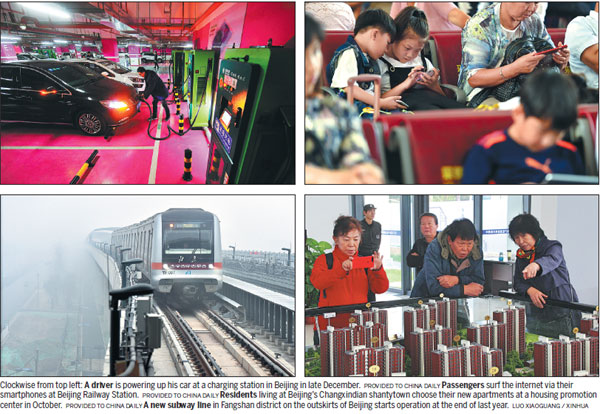Infrastructure, environment benefit from rising spending
Government investment leads to improved living standards in capital
The Beijing government has invested heavily in improving infrastructure, housing and environmental protection.
Data from the Beijing Municipal Commission of Housing and Urban-Rural Development show that 278.19 billion yuan ($44 billion) was spent on key construction projects in the city last year.
Close to half of the expenditure, 126.95 billion yuan, was used to build apartments for low-income groups, improve shantytowns, and add new public amenities and services.
The amount was 117.4 percent of what was originally planned in early 2017 and occupied the lion's share of the city government's yearly investment.

Government data show that 49,540 households in shantytowns benefited from the government initiative to increase residents' well-being last year, a 37.6 percent surge from the planned 36,000 households.
More than 100,000 families in the city, covering 9.56 million square meters, became beneficiaries of an improved heat supply network.
The city government finished 30 key projects closely related to improving locals' quality of life in 2017.
In transportation, three new subway lines started operations at the end of last year and 12 roads totaling 1.35 million sq m were renovated.
A total of 24 new bus service lines were launched and 16 routes were optimized.
Local authorities also redesigned transportation hubs and improved administration in a bid to reduce traffic congestion.
In environmental protection, more than 900 villages began to use clean energy, 29 streams and rivers were cleaned up, and 44,700 sq m of green coverage was added.
That included 10 parks and another 10 forest demonstration sites which are home to 46,667 hectares of trees.
Three green areas, which cover a total of 101,000 sq m, were developed, where roughly 50 new tree species were introduced.
When it comes to public services, the Beijing government built and renovated more than 1,200 service centers in residential communities to facilitate vegetable supplies and offer services including catering, convenience stores, housekeeping, hairdressing, washing and deliveries.
In tourism attractions, such as the Olympic Park and Prince Kung's Mansion, 120 public toilets were installed with an improved heat network or drainage system.
To meet the growing demand for new energy vehicles, more than 280 power stations with a total of 3,037 charging pillars were added across the city.
As Beijing is promoting information technology-based services, 651 public venues including the popular tourist destination Temple of Heaven have provided free Wi-Fi service access. In addition, a growing number of administrative services went online.
To expand its cultural services, the government handed out online coupons worth 50 million yuan, for stage dramas, books, videos, and other cultural and sports events.
In addition, 71 bookstores received government aid worth 18 million yuan in total to upgrade facilities, add books and host reading events.
Facing growing demand from the aging population, the city has built 230 eldercare service centers in residential communities, with a focus on those living alone or disabled.
Meanwhile, the city government is advancing a cross-regional healthcare promotional program, which involves more than 2,000 traditional Chinese medicine practitioners and health management experts, 150 service teams and 80 service institutions from seven districts including Dongcheng and Haidian. Over 130,000 chronic disease patients benefited from the program last year.
To reduce safety risks, the government had 3,000 elevators in old buildings checked for safety, repaired 45 sites with hazards at 22 scenic spots and replaced gas cookers for more than 81,000 low-income families.
Local authorities also increased welfare benefits, such as pensions, unemployment benefits, compensation for injuries and damages at work, and government aid for low-income households and vulnerable groups.
The government also created 122,000 jobs and granted allowances for nearly 17,490 rural teachers.

(China Daily 01/30/2018 page12)














